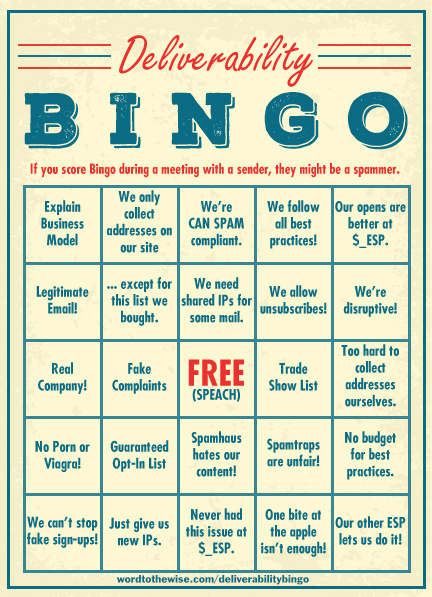Yesterday’s post was inspired by a number of questions I’ve fielded recently from people in the email industry. Some were clients, some were colleagues on mailing lists, but in most cases they’d found a delivery issue that they couldn’t solve and were looking for the elusive Human Representative of an ISP.
There was a time when having a contact inside an ISP was almost required to have good delivery. ISPs didn’t have very transparent systems and SMTP rejection messages weren’t very helpful to a sender. Only a very few ISPs even had postmaster pages, and the information there wasn’t always helpful.
More recently that’s changed. It’s no longer required to have a good relationship at the ISPs to get inbox delivery. I can point to a number of reasons this is the case.
ISPs have figured out that providing postmaster pages and more information in rejection messages lowers the cost of dealing with senders. As the economy has struggled ISPs have had to cut back on staff, much like every other business out there. Supporting senders turned into a money and personnel sink that they just couldn’t afford any longer.
Another big issue is the improvement in filters and processing power. Filters that relied on IP addresses and IP reputation did so for mostly technical reasons. IP addresses are the one thing that spammers couldn’t forge (mostly) and checking them could be done quickly so as not to bottleneck mail delivery. But modern fast processors allow more complex information analysis in short periods of time. Not only does this mean more granular filters, but filters can also be more dynamic. Filters block mail, but also self resolve in some set period of time. People don’t need to babysit the filters because if sender behaviour improves, then the filters automatically notice and fall off.
Then we have authentication and the protocols now being layered on top of that. This is a technology that is benefiting everyone, but has been strongly influenced by the ISPs and employees of the ISPs. This permits ISPs to filter on more than just IP reputation, but to include specific domain reputations as well.
Another factor in the removal of the human is that there are a lot of dishonest people out there. Some of those dishonest people send mail. Some of them even found contacts inside the ISPs. Yes, there are some bad people who lied and cheated their way into filtering exceptions. These people were bad enough and caused enough problems for the ISPs and the ISP employees who were lied to that systems started to have fewer and fewer places a human could override the automatic decisions.
All of this contributes to the fact that the Human Representative is becoming a more and more elusive target. In a way that’s good, though; it levels the playing field and doesn’t give con artists and scammers better access to the inbox than honest people. It means that smaller senders have a chance to get mail to the inbox, and it means that fewer people have to make judgement calls about the filters and what mail is worthy or not. All mail is subject to the same conditions.
The Human Representative is endangered. And I think this is a good thing for email.
Read More
